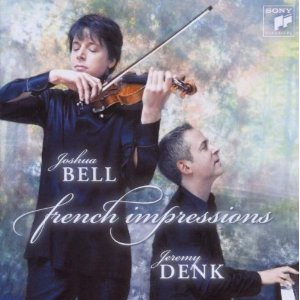Classical CDs Weekly: Andriessen, Korngold, Tchaikovsky, Joshua Bell | reviews, news & interviews
Classical CDs Weekly: Andriessen, Korngold, Tchaikovsky, Joshua Bell
Classical CDs Weekly: Andriessen, Korngold, Tchaikovsky, Joshua Bell
Two violinists tackle chamber music and concerti, and some punchy minimalism from the Netherlands

 Louis Andriessen: Anaïs Nin, De Staat London Sinfonietta and soloists/Atherton (Signum)
Louis Andriessen: Anaïs Nin, De Staat London Sinfonietta and soloists/Atherton (Signum)
A friend of mine studied with the Dutch composer Louis Andriessen in the 1980s. He sent me a cassette (remember those?) of De Staat, and I can remember being bowled over by the music’s stark majesty and rhythmic punchiness, Andriessen’s repetitive vocal lines soaring over minimalist riffs, more redolent of Stravinsky than Glass. Written in the mid-1970s, Andriessen wrote of one early performance that he “had to sing every note for them (the musicians), because they articulated the piece like Bruckner or Mahler. And it should be articulated like Count Basie and Stan Kenton!” There’s a thrilling 1990s recording of the work by Reinbert de Leeuw’s Schoenberg Ensemble which is now unavailable. David Atherton’s London Sinfonietta live performance isn’t as viscerally exciting, but it does have the amplified Synergy Vocals’ immaculate delivery of the Plato text. Don’t get too bogged down in trying to comprehend Andriessen’s long-winded attempts to explain what the piece is about – just enjoy the noise. It’s fantastic.
De Staat is the coupling for the more recent monodrama Anaïs Nin. Completed in 2010 and setting words drawn from the author’s diaries, it doesn’t excite in the same way, despite the occasionally salacious text and Cristina Zavalloni’s virtuoso delivery. Andriessen’s music recalls Eisler, Weill and 1930s jazz, often brilliantly evocative, spare and haunting in places. But it lacks the compelling, edgy oomph of the earlier work.

Not to everyone’s taste, Korngold’s 1947 Violin Concerto skilfully recycles themes written for Hollywood film soundtracks. It was dedicated to Alma Mahler and famously taken up by the great Jascha Heifetz. As befits this Austrian prodigy who became a successful émigré film composer, Korngold was a master manipulator of listeners’ emotions – here, flattering the audience into thinking they’re hearing something dangerously modern and sophisticated, when beneath the veneer it’s basically 19th-century schmaltz. Accept that, enjoy it, and this is a stunner of a concerto – beautifully proportioned and with several staggering moments. Laurent Korcia’s delivery of the solo line is stunning, but you’ll be knocked sideways by the glorious passage in the last movement where massed horns suddenly thrust upwards. It’s never sounded fruitier. And yes, it doesn’t sound particularly original until you realise that the motif and its treatment have been ripped off by countless subsequent film scores.
Korcia’s coupling is a boldly drawn, affectionate performance of the Tchaikovsky Concerto. It’s refreshing to hear Korcia’s unforced lyrical gift in the Andante, but even more impressive is the alarming speed and impetuosity of the closing movement. Your jaw drops. The disc is affectionately conducted by Jean-Jacques Kantorow (another former violin prodigy) who draws tight, affectionate playing from his Belgian forces. This is the most entertaining violin concerto disc I’ve heard in months.

Move beyond the glossy packaging and swish typography and you find a really decent, well-planned recital. Pianist Jeremy Denk argues in his sleeve notes that French repertoire requires a very particular approach – one which revels in the music’s colours, sensuality and humour. You’d be hard pressed to find a version of Ravel’s Sonata which offers as much fun as this one; you can visualise Joshua Bell winking as he negotiates the second movement’s insouciant smears and pizzicato notes. And the last movement’s perpetuum mobile is so brilliant you’ll want to immediately play it again, Bell’s frenetic scrapings finally underpinned by some of juicy piano harmonies. I struggle with Ravel at times; his music can too often seem over-fussy and emotionally cold, but he always sounds engaged in this compact, miraculous piece.
The most expansive work here is Franck’s Sonata. I like Denk’s lightness of touch in the equivocal opening bars, and the softening of tone he manages after Bell’s quietly ecstatic entry. This is a great performance, especially in the steady Allegretto of the last movement. Franck’s genius here lies in his avoidance of conventional musical rhetoric; there’s no big Beethovenian drama in the usual sense. Saint-Saëns’s Sonata No 1 can’t help feeling a little more stuffy in its first movement, but Bell and Denk rightly emphasise this still underrated composer’s brilliant gifts as an entertainer. The manic finale isn’t a resolution at all, but it’s a life-enhancing ride. Sony’s sound is immaculate.
Bell and Denk play excerpts from French Impressions
Explore topics
Share this article
The future of Arts Journalism
You can stop theartsdesk.com closing!
We urgently need financing to survive. Our fundraising drive has thus far raised £49,000 but we need to reach £100,000 or we will be forced to close. Please contribute here: https://gofund.me/c3f6033d
And if you can forward this information to anyone who might assist, we’d be grateful.

Subscribe to theartsdesk.com
Thank you for continuing to read our work on theartsdesk.com. For unlimited access to every article in its entirety, including our archive of more than 15,000 pieces, we're asking for £5 per month or £40 per year. We feel it's a very good deal, and hope you do too.
To take a subscription now simply click here.
And if you're looking for that extra gift for a friend or family member, why not treat them to a theartsdesk.com gift subscription?
more Classical music
 Goldscheider, Brother Tree Sound, Kings Place review - music of hope from a young composer
Unusual combination of horn, strings and electronics makes for some intriguing listening
Goldscheider, Brother Tree Sound, Kings Place review - music of hope from a young composer
Unusual combination of horn, strings and electronics makes for some intriguing listening
 theartsdesk Q&A: composer Donghoon Shin on his new concerto for pianist Seong-Jin Cho
Classical music makes its debut at London's K-Music Festival
theartsdesk Q&A: composer Donghoon Shin on his new concerto for pianist Seong-Jin Cho
Classical music makes its debut at London's K-Music Festival
 Helleur-Simcock, Hallé, Wong, Bridgewater Hall, Manchester review - moving lyricism in Elgar’s concerto
Season opener brings lyrical beauty, crisp confidence and a proper Romantic wallow
Helleur-Simcock, Hallé, Wong, Bridgewater Hall, Manchester review - moving lyricism in Elgar’s concerto
Season opener brings lyrical beauty, crisp confidence and a proper Romantic wallow
 Kohout, Spence, Braun, Manchester Camerata, Huth, RNCM, Manchester review - joy, insight, imagination and unanimity
Celebration of the past with stars of the future at the Royal Northern College
Kohout, Spence, Braun, Manchester Camerata, Huth, RNCM, Manchester review - joy, insight, imagination and unanimity
Celebration of the past with stars of the future at the Royal Northern College
 Jansen, LSO, Pappano, Barbican review - profound and bracing emotional workouts
Great soloist, conductor and orchestra take Britten and Shostakovich to the edge
Jansen, LSO, Pappano, Barbican review - profound and bracing emotional workouts
Great soloist, conductor and orchestra take Britten and Shostakovich to the edge
 Jakub Hrůša and Friends in Concert, Royal Opera review - fleshcreep in two uneven halves
Bartók kept short, and a sprawling Dvořák choral ballad done as well as it could be
Jakub Hrůša and Friends in Concert, Royal Opera review - fleshcreep in two uneven halves
Bartók kept short, and a sprawling Dvořák choral ballad done as well as it could be
 Hadelich, BBC Philharmonic, Storgårds, Bridgewater Hall, Manchester review - youth, fate and pain
Prokofiev in the hands of a fine violinist has surely never sounded better
Hadelich, BBC Philharmonic, Storgårds, Bridgewater Hall, Manchester review - youth, fate and pain
Prokofiev in the hands of a fine violinist has surely never sounded better
 Monteverdi Choir, ORR, Heras-Casado, St Martin-in-the-Fields review - flames of joy and sorrow
First-rate soloists, choir and orchestra unite in a blazing Mozart Requiem
Monteverdi Choir, ORR, Heras-Casado, St Martin-in-the-Fields review - flames of joy and sorrow
First-rate soloists, choir and orchestra unite in a blazing Mozart Requiem
 Cho, LSO, Pappano, Barbican review - finely-focused stormy weather
Chameleonic Seong-Jin Cho is a match for the fine-tuning of the LSO’s Chief Conductor
Cho, LSO, Pappano, Barbican review - finely-focused stormy weather
Chameleonic Seong-Jin Cho is a match for the fine-tuning of the LSO’s Chief Conductor
 Classical CDs: Shrouds, silhouettes and superstition
Cello concertos, choral collections and a stunning tribute to a contemporary giant
Classical CDs: Shrouds, silhouettes and superstition
Cello concertos, choral collections and a stunning tribute to a contemporary giant
 Appl, Levickis, Wigmore Hall review - fun to the fore in cabaret and show songs
A relaxed evening of light-hearted fare, with the accordion offering unusual colours
Appl, Levickis, Wigmore Hall review - fun to the fore in cabaret and show songs
A relaxed evening of light-hearted fare, with the accordion offering unusual colours
 Lammermuir Festival 2025, Part 2 review - from the soaringly sublime to the zoologically ridiculous
Bigger than ever, and the quality remains astonishingly high
Lammermuir Festival 2025, Part 2 review - from the soaringly sublime to the zoologically ridiculous
Bigger than ever, and the quality remains astonishingly high

Add comment